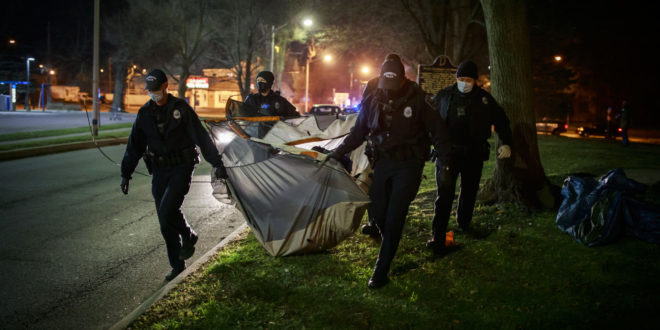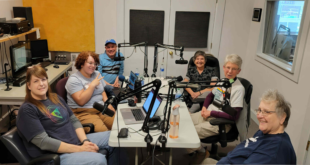Podcast: Play in new window | Download (Duration: 9:47 — 6.8MB)
Rev. Forrest Gilmore is Executive Director of Beacon Inc., a community organization dedicated to solutions for people in poverty. WFHB reporter Aaron Comforty interviewed Gilmore on the City’s clandestine actions to remove a homeless encampment from Seminary Park.
This interview has been lightly edited for brevity and clarity.
AC: Rev. Gilmore, thanks for coming on the program.
Rev. G: Thank you. Glad to be with you.
AC: Could you please summarize for us the events that took place on Wednesday night at Seminary Park?
Rev. G: Sure. I think there’s some important context, which is what happened the day before. But on that evening, police and some social workers and caseworkers came into Seminary Park to warn people, who were sleeping there in their tents, that they were going to have to leave within an hour, when the park closed at 11:00PM. Following that, police did come in. Public transportation that was provided by the City, but people were not permitted to stay in the park. A small number of people took the public transportation: one went to Wheeler Mission, and two or three went to the Stride Center. The remainder of the people went elsewhere.
AC: The Office of the Mayor coordinated this action and the next day it put out a press release which stated, “Homelessness is an issue which requires the whole community. We always appreciate and welcome ideas… We want to hear from you.” The release seemed to convey a different sentiment from the formal statement made by the board of directors at your organization, Beacon Inc. You called the event, “A failure of local democracy.” Why the choice of those words?
Rev. G: Yeah, I think the biggest thing was in relation to what happened the night before. The day before, there was a Parks Commissioner Board meeting, and there was a proposal to ban tents in parks during the day. Camping had already been banned overnight at the parks. It was one of the most astonishing and beautiful things I’ve ever seen. More than 230 people came to that meeting to say that they did not want this daytime ban and many also said we should remove the overnight tent ban. Every single speaker was against the daytime ban. It was just an extraordinary response from the community saying, ‘This is not what we want.’ People came away feeling such good-hearted positivity and hope when the Parks Board Commissioners voted the tent ban down. There was so much hope, and for that to be dashed so readily, just a little over twenty-four hours afterwards, was just heartbreaking for many many people in the community, not to mention the people who were especially impacted by that move.
AC: The encampment eviction has very real world consequences . I think it’s fair to estimate that dozens of people were in the park at the time the City forcibly cleared the encampment. What’s the situation on the ground now. Do you know how any of the people who were forced to move are doing?
Rev. G: It certainly had a lot of impact on people, in that it disrupted their place of sleep that evening. It also led to the City taking possession of many of the people’s belongings, which were later left in a pile in a parking lot for them to pick up. The possessions were unlabeled, unseparated, and piled on top of each other, so tent poles and things like that were broken.
AC: So people’s possessions were brought to a parking lot – of course a lot of the homeless people affected may not have cars. How could they pick their belongings up?
Rev. G: Various allies and advocates helped retrieve much of the stuff, but it took a significant effort. You know, the tents are back up. So many people are camping again in the same locations. We’re in a position now where people are asking, ‘why was that even done?” Especially given the very clear voice of the community the day before.
AC: Bloomington Mayor John Hamilton, and Deputy Mayor Renneisen were both present, at least for parts of the Parks meeting. Presumably they were aware of the outpouring of opposition to the tent ban. The Mayor’s Office however, dismissed the concern in its press release, and basically said that the tents at Seminary Park are not really an encampment, because people aren’t actually sleeping there. How would you respond to Mayor Hamilton’s characterization of the tent situation at Seminary Park?
Rev. G: Honestly, it’s simply false and quite silly to even consider that as an option. Of course people are sleeping over nights in tents in our parks every single night. Maybe not every tent was occupied by someone who was sleeping in them, but absolutely, there were people sleeping there. The idea that people weren’t camping there or that we can’t call it an encampment, it doesn’t hit the mark, and honestly, I’m surprised by such an argument. Honestly, it borders on insulting.
AC: The clearing of Seminary Park comes at the confluence of the cold winter weather and a global pandemic. Months ago, the CDC published guidance which explicitly recommends not removing people from encampments because of an increased risk of exposure to Covid-19. People who are removed from encampments could either get it in a new place, wherever they have to go, or they could spread it to a new place. So how is that playing out here? What are the public health ramifications of the Mayor’s approach on Wednesday night?
Rev. G: Truthfully, we don’t know the impacts. We’re in a state that has one of the highest infections rates in the country. So obviously we’re losing 3,000 people a day nationally. This is the worst the Covid crises has been in the U.S. going back to the very beginning. To not even take that or the CDC guidelines, which were brought up numerous times the night before at the Parks meeting, into consideration, was a stunning decision to me.
AC: The City did not provide any advanced warning or notice that it was going to be undertaking this operation. What do you think was the motivation behind Mayor Hamiloton’s insistence on clearing the park?
Rev. G: I’ll say that not only was there not any warning, but earlier in the day, there were City staff telling us that the City was going to back off and not break up the camps. So we were under the impression that it wasn’t going to happen at all, much less within a few short hours of that conversation. I honestly don’t know what the motivation for this is. I know that there are definitely some concerns with litter and defecation and things like that, which are certainly problematic and challenging. It’s something that comes with this type of street homelessness everywhere in our country, but the City chose to break up the camp instead of taking another approach to dealing with those issues.
AC: Rev. Gilmore, thank you so much for coming on WFHB Local News.
Rev. G: My pleasure. Thank you, Aaron.
 WFHB Bloomington Community Radio
WFHB Bloomington Community Radio


